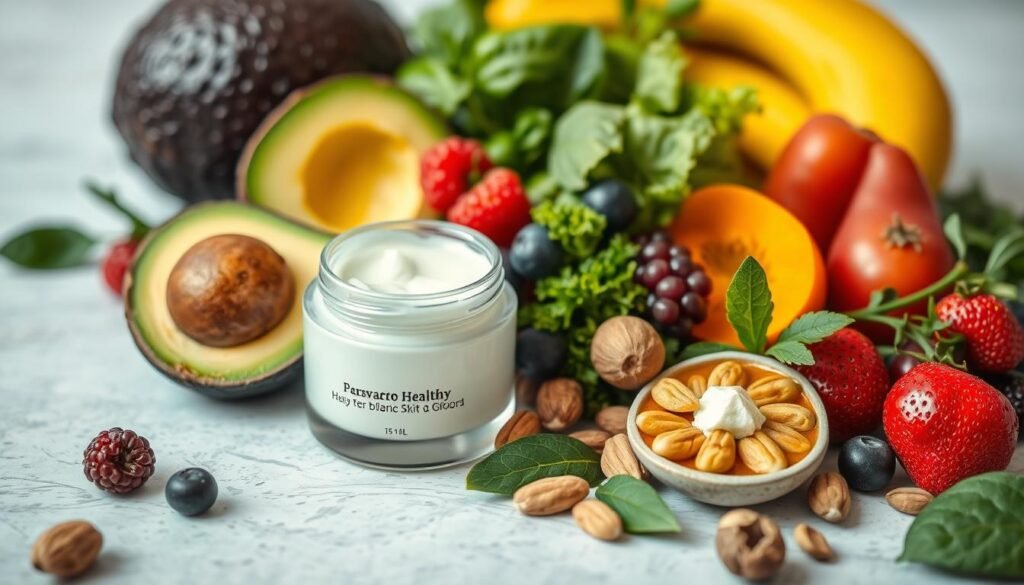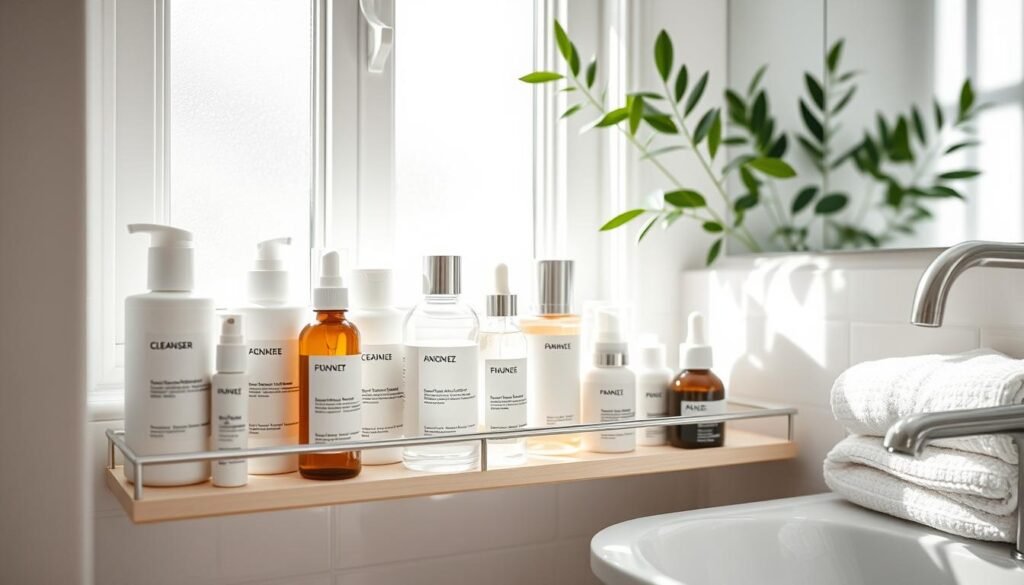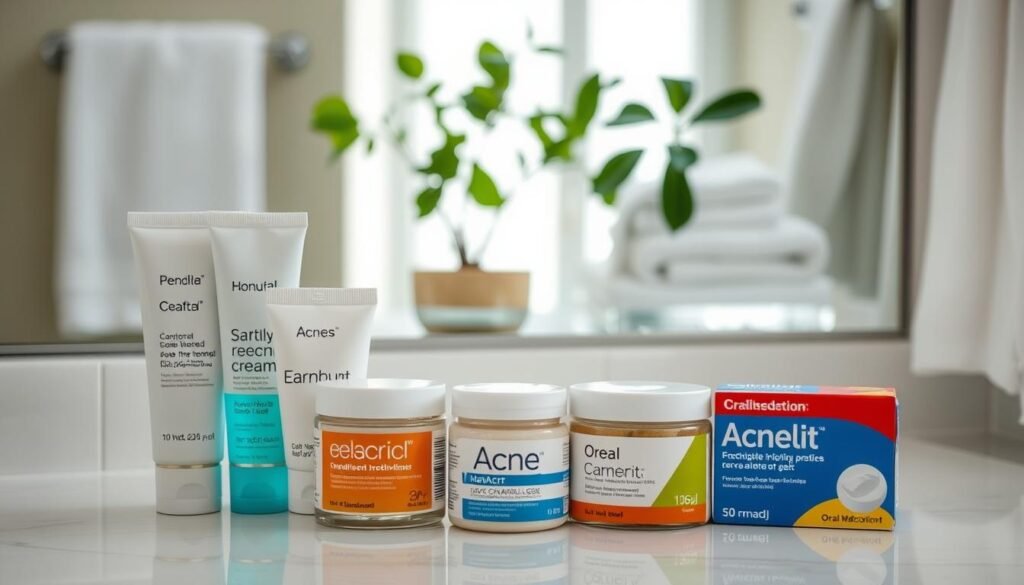About 80% of teens face acne during their teenage years. Even though it’s common, lots of people still don’t fully understand it. This article aims to clear up the confusion. It provides answers to often asked questions and gives insight into handling acne. We will discuss treatment options, skincare, and when to see a doctor. Our information comes from experts and studies, aiming to help you manage acne.
Key Takeaways
- Acne is the most common skin disorder, affecting both teenagers and adults.
- Dietary choices can significantly influence acne severity, with high-glycemic foods and dairy being particularly detrimental.
- Topical treatments are generally effective for mild to moderate acne, while more severe cases may need oral medications.
- Understanding individual skin types is crucial for selecting the right acne treatment.
- Effective skincare routines play a vital role in acne management, emphasizing gentle cleansing and appropriate product choice.
- Professional consultation is advised for persistent or severe acne to prevent scarring and emotional distress.
Understanding Acne: What It Is and How It Forms
Acne is a skin issue that affects many people, often starting in puberty. It’s caused by too much oil, blocked pores, bacteria, and swelling. Knowing how acne starts is key to dealing with it.
Puberty makes oil glands work overtime, leading to acne. This extra oil can block hair follicles. This blockage is perfect for acne to grow. Acne can show up as whiteheads, blackheads, or even painful cystic acne. Bacteria can make the problem worse, causing bigger and more inflamed spots.
Acne isn’t just for teens; around 20% of cases are in adults. It’s more common in women, even into their 30s and beyond. Acne mostly appears on the face, but also on the neck, chest, back, shoulders, and upper arms. Stress doesn’t cause acne but can make it worse.
Many factors can make acne worse. These include hormone changes, certain meds, genetics, diet, and skin pressure. Some adults keep getting acne due to how their skin reacts to oil and bacteria, not because of hormones. Knowing these triggers helps in finding ways to prevent or lessen acne.
To sum up, understanding what causes acne and how it develops can help manage skin care better.
Frequently Asked Questions About Acne
Many people deal with acne at some point in their lives. There are many myths about acne that need clearing up. For instance, it’s not just about what you eat or how often you wash your face. Hormones play a big role in causing acne. By looking at educational resources, we can understand the truth better.
Common Misconceptions
There are many wrong ideas about acne out there. Some think stress directly causes it. But while stress can make skin problems worse, it isn’t the main cause. Another myth is that only teens get acne. However, people of all ages, including those in their 20s to 40s, can have it. It’s important to know the facts for effective acne management.
Recognizing Types of Acne
Knowing the types of acne is key to treating it right. There are several kinds:
- Hormonal Acne: Often linked to changes in hormones.
- Cystic Acne: Involves deep, painful cysts under the skin.
- Acne Vulgaris: The most usual type, especially in teens.
Understanding these types helps in finding the best treatment. This is crucial for reducing acne scars and boosting confidence. Luckily, treatments keep getting better, helping those affected find the right solution and move past the myths.
Do Hormones Really Affect Acne?
Hormones play a key role in why some people get acne, especially if they are teenagers or if someone is pregnant or going through menopause. These changes can make your skin greasy. That leads to pimples. Knowing about these hormonal triggers can help people deal with their acne better.
If you have a hormonal imbalance, it might make your acne worse. This is why it’s important to know and act early to treat your skin right.
Understanding Hormonal Triggers
Hormonal acne isn’t just for teens; it can also bother people in their 20s and older. Women often see their acne get worse at times of hormonal change. Testosterone, for example, can make your skin more oily and cause pimples.
Many women see a pattern with their acne, like it getting worse around their period. Knowing these patterns can help you find better ways to take care of your skin.
The Impact of Menstrual Cycles
A lot of women get more acne before or during their period. The hormones change at these times, making skin more oily and swollen. Realizing this can help you get ready and take steps to lessen breakouts. You might change how you care for your skin before your period comes.
Customizing your skincare to fit how your hormones affect your skin can really help. For tips on how to fight acne myths, read this great article here.
Diet and Acne: Does What You Eat Matter?
It’s vital to understand how diet affects acne for managing it well. Previous beliefs said diet didn’t really affect acne, but now we know better. Identifying acne triggers in your food and eating more skin health-friendly foods is key.
Foods to Avoid
Certain foods are more likely to make acne worse. Studies show that:
- High-sugar snacks and drinks can increase inflammation.
- Dairy products might make acne worse, though research is mixed.
- Processed foods with trans-fats and refined carbs can lead to more breakouts.
Tracking what you eat helps you see how it affects your skin. Cutting out these foods can lead to clearer skin and better control over diet and acne.
Potential Beneficial Foods
Some foods, however, can actually help your skin look better. Adding these beneficial foods can boost skin health:
- Antioxidant-packed fruits and veggies offer protection.
- Omega-3s in fish and flaxseed can lower inflammation.
- Whole grains and legumes are great for skin repair.
- Prebiotics and probiotics support skin’s vitality.
Choosing a diet full of these healthy options can offset the bad effects of processed foods. For more advice on diet and acne, it’s smart to talk to a healthcare expert. They can help tailor dietary choices to your unique needs.

Does Makeup Cause Acne Breakouts?
Makeup plays a big role in skin health. Acne and makeup have a tricky relationship. This is especially true when makeup clogs pores and causes breakouts. Some people might find makeup makes their acne worse. But, picking the right makeup can lower this problem.
Choosing Non-Comedogenic Products
It’s key to choose makeup that won’t clog pores, especially for acne-prone skin. Non-comedogenic products are made to prevent this. Certain ingredients are more likely to cause acne. They either clog pores or trigger allergies. Watch out for ingredients like:
- Acetylated lanolin
- Butyl stearate
- Cetyl acetate
- Coconut oil
- Sodium lauryl sulfate
Be mindful of how you apply makeup too. Using dirty brushes, not cleaning off makeup at night, or using thick makeup can up your risk of acne cosmetica.
Impact of Hair Products on Acne
Hair products can also lead to acne. Ingredients in styling products and shampoos can touch your face and cause breakouts. It’s important to think about how hair products might affect your acne. This is true especially if they leave behind residue.
| Ingredient | Comedogenic Rating | Potential Impact |
|---|---|---|
| Acetylated lanolin | 4 | Highly comedogenic, leads to breakouts |
| Coconut oil | 4 | Can clog pores, leading to acne |
| Sodium lauryl sulfate | 3 | May irritate and contribute to acne |
| Petrolatum | 4 | Thick texture can block pores |
| Bismuth oxychloride | 3 | Common in mineral makeup, can irritate skin |
Selecting the right makeup and watchful of hair products is critical for clear skin. Good hygiene habits make a big difference too. This combination can help reduce acne outbreaks significantly.
How Important is Skincare Routine for Acne Management?
A good skincare routine is vital for keeping acne under control. With the right steps, you can see healthier skin and fewer breakouts. It’s crucial to wash effectively and use the right moisturizers.
Washing Techniques That Work
Cleaning your face the right way is key. Gentle cleansers take away dirt and oil but don’t hurt your skin. Below, find tips that actually help:
- Choose the Right Cleanser: Pick products that don’t block pores.
- Be Gentle: Lukewarm water and soft touches avoid skin damage.
- Frequency: Washing morning and night keeps the skin clean.
Benefits of Moisturizers
Moisturizers play a big part in acne care but are often missed. They keep your skin moist, which helps reduce acne by:
- Reduced Oil Production: If your skin is moist, it makes less oil.
- Improved Skin Barrier: A strong moisture barrier protects against harmful stuff.
- Enhanced Absorption: Moisturizers help acne treatments work better.

| Element | Importance in Acne Management |
|---|---|
| Skin Cleansers | Removes dirt and excess oil while preventing irritation. |
| Moisturizers | Maintains hydration and sustains skin barrier function. |
| Frequency of Washing | Helps prevent buildup of impurities that can cause breakouts. |
When to See a Dermatologist for Acne
Acne is common, affecting most teens and half of adult women. If you’re dealing with bad breakouts, see a dermatologist. They offer professional help, find what causes your acne, and create a plan just for you.
Acne isn’t just a skin issue; it can hurt emotionally, like a long-term illness. For tough acne, like cystic types, store treatments might not work. That’s when a dermatologist’s help is key.
Often, dermatologists suggest treatments that are easy on your skin first. Products like salicylic acid and benzoyl peroxide could take weeks to work. For harder cases, they might prescribe stronger treatments.
If acne is making your life hard, a dermatologist can make a big difference. With their guidance, you can see a real improvement in your skin and feel better, too.
Acne Treatments: Exploring Your Options
People with acne often look for acne treatment options suited to their skin needs. Many treatments are available, including topical treatments and oral medications. It’s key to understand these options to create an effective treatment plan.
Topical Treatments
Topical treatments are usually tried first for acne. Products with benzoyl peroxide can lessen acne by fighting bacteria and keeping pores clear. Also, topical retinoids like tretinoin and adapalene help with moderate acne. They’re often used in the evening, starting three times a week. Tea tree oil, at a 5% concentration, might work as well as benzoyl peroxide but be less irritating.

Oral Medications and Their Effectiveness
For severe acne, doctors might suggest oral medications. Antibiotics can help by reducing inflammation and bacteria. For women, certain oral contraceptives are approved for acne treatment. Spironolactone can also be used to block hormones that cause oil production. Isotretinoin is a strong option for tough acne cases but has serious side effects like depression and birth defects.
It can take 4 to 8 weeks to see improvements from these medications. Full acne clearance might take months or even years.
Acne Scars: Do They Fade Over Time?
Dealing with acne scars can feel as tough as handling active acne. It helps to know about the different acne scar types and treatment options. Some scars fade over time, but others need extra help to heal well.
Types of Acne Scars
Different acne scars may appear after breakouts. It’s not unusual to get more than one type, such as:
- Ice Pick Scars: Deep, thin scars that look like small holes.
- Boxcar Scars: Broad, shallow scars with sharp edges, similar to chickenpox scars.
- Rolling Scars: Scars that give the skin a wavy texture.
- Hypertrophic Scars: Thick, raised scars above the skin.
- Keloid Scars: Large, raised scars that can grow bigger over time.
- Dark Spots: Brown marks left after acne, which usually fade.
- Perifollicular Elastolysis: Changes near hair follicles, seen as scarring.
Deep acne like cystic or nodular acne is more likely to scar. These visible scars can impact how we feel about ourselves, especially if they’re large and noticeable.
Treatment Options for Scarring
There are many treatments available for scars, depending on their type and severity. Popular methods include:
- Laser Therapy: The Fraxel® Dual Laser works well for surface scars, and the VBeam Pulsed Dye Laser reduces redness.
- Chemical Peels: They help by peeling off the top skin layer to improve texture and look.
- Microdermabrasion: It makes the skin tone better but doesn’t get rid of scars.
- Microneedling: Helps heal the skin by boosting collagen production.
- Fillers: Good for deep scars, may need updates every six to eighteen months.
- Surgical Options: Advanced treatments to make the skin look better.
Home treatments include using creams, staying hydrated, and using sunscreen to protect the skin. Handling acne quickly, not picking at it, and a good skincare routine can lower the chance of scars forming.
Conclusion
Dealing with acne can be tough, but learning key skincare tips helps. This article covered acne FAQs and gave a full look at acne. It talked about what causes it, how what we eat affects it, and how to take care of our skin. Now, people with acne know more about how to take care of their skin.
Everyone’s acne is different, and finding what works can take time. It’s important to try different treatments and get help from experts if needed. Knowing how to manage acne can lead to clearer skin and more confidence. Remember, it’s not just about getting rid of acne. It’s about feeling good about yourself.
This article provides useful tips for those struggling with their skin. It blends practical advice with science-based facts. This helps readers manage their skincare better and work towards healthier skin.